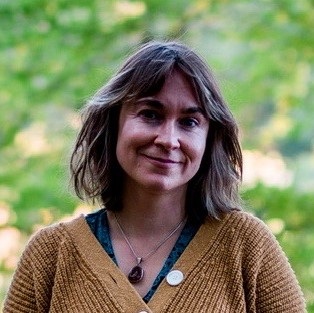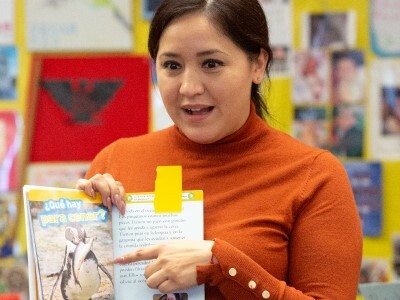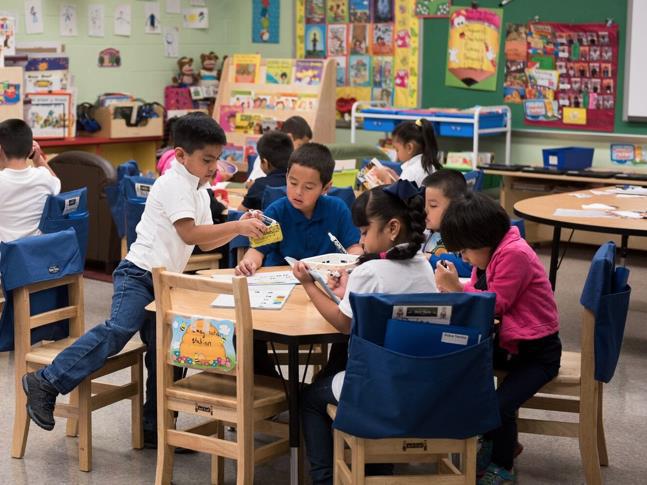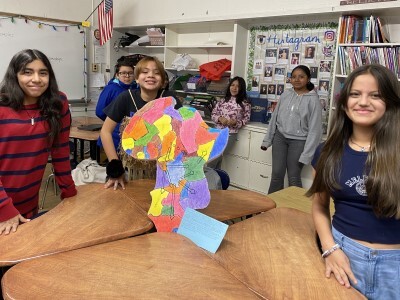Courage in Following the Unknown: Taking the Leap as a Facilitator of Deeper Adult Learning Experiences
Topics
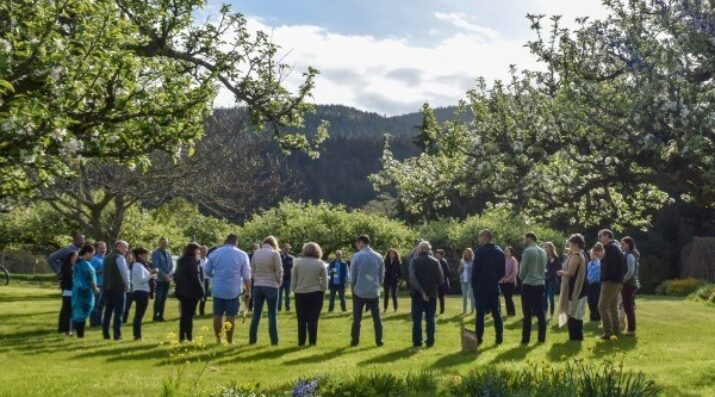
Educators are the lead learners in schools. If they are to enable powerful, authentic, deep learning among their students, they need to live that kind of learning and professional culture themselves. When everyone is part of that experiential through-line, that’s when next generation learning thrives.
Why is it so difficult to apply deeper learning principles to teachers' professional development on deeper learning?
Some years ago, I attended a professional development workshop on deep learning. At the time, I was a high school English teacher who was shifting my classroom practice from a traditional, teacher-centered style to one that put students at the helm of their own learning experiences, and I was eager to learn new ways to move my students even further to the center of my classroom.
But as the opening PowerPoint presentation passed the hour mark, I found my attention drifting. The irony struck me: This workshop on authentic learning experiences was not an authentic learning experience. While the facilitator had demonstrated their expertise, they had not applied it to the adult learning experience they were leading. As a result, much of the workshop’s potential to inspire deep learning in its participants’ classrooms was lost.
My experience isn’t an isolated one. We’ve all attended more than our share of professional development run by fellow educators who have fallen into the same trap—teacher workshops that take a one-size-fits-all approach to their topics, educators’ retreats built around the facilitator’s experiences or research agendas, new teacher trainings consisting of a flood of information, interrupted by occasional calls for questions. One friend told a story of a graduate school professor who taught differentiated instruction methods by reading a Word document to the class. Some of us may even have fallen into this trap ourselves as facilitators. (I’m afraid that I’ve subjected colleagues to quite a few inauthentic learning experiences over the years.)
It takes courage to reveal the limits in our own expertise when we are with our students. But it takes an even deeper level of bravery to do so in front of our peers.
Why is it so difficult to walk our own talk? Perhaps it is because deeper learning is many things—serendipitous, discovery-driven, dynamic—but comfortable (at least initially) isn’t one of them. To truly meet students where they are, while honoring who they are and what they hold close, requires flexibility, humility, and grace in the face of the unpredictable. It requires an openness to scrapping what you thought you knew—and what you expected would happen—in favor of following an authentic inquiry to an unexpected place.
It takes courage to reveal the limits in our own expertise when we are with our students. But it takes an even deeper level of bravery to do so in front of our peers. To commit to facilitating deeper learning experiences for our peers—experiences that we can’t ensure will run smoothly, that we can’t promise will end with neatly-packaged “take-aways”—is to concede that the role of “leader” is, in fact, a supporting one. It means committing to being vulnerable before them, with them, and for them. And being vulnerable is scary. It requires that we trust our colleagues not to see these limitations as weaknesses—to trust that they will instead see our honesty as an invitation to make their own candid contributions toward a co-created vision.
I was nervous the first time I led a deeper learning experience for my colleagues. Shortly after my disappointing workshop-attending experience, my school’s administrators asked me to lead a new collaborative initiative, in which teachers across subjects would coordinate their approaches to teaching transferable skills like reading, writing, and problem solving. Excited as I was about the work, I felt woefully inexpert to lead it. What did reading look like in math class? Problem solving in history? Were there underlying writing principles held in common between English essays and lab reports, despite one being built upon a hypothesis and the other a thesis? My answers to these questions were dim and untested.
As I began preparing to lead the initiative’s inaugural workshop, I knew that “sage on stage” was a role well outside of my range. Instead, I needed to cultivate space where my colleagues could share their unique perspectives and knowledge, identifying the commonalities and complications upon which we would build this new curriculum. My role as their “leader” was simply to give them the space and support to embark upon this co-creation.
I remember feeling a flurry of nerves as I entered the workshop space. I had prepared so little content—just sets of goals for the project and the session, and a series of open-ended questions that my colleagues would consider from their multiple perspectives. Part of me still believed that content was itself a credential, still worried that my colleagues would balk at how much I was asking them to give.
It was not always a comfortable meeting. With a room full of people—each with different contexts and experiences informing their perspectives—disagreements inevitably arose. The tension between some ideas remained acknowledged but unresolved at the end of the day.
But there was also generosity, discovery, and trust. My colleagues were eager to share what they knew with each other and open to admitting what they didn’t, and they called upon their varied experiences to move each other closer to a shared curricular goal. The fears I had felt were unfounded. By leading with vulnerability, I had shown my colleagues that I trusted them to give our project shape, and they were eager to fill the space with meaningful co-creation.
What they would have seen instead was a room full of experts—adult learners approaching a meaningful task with the type of purpose, agency, and creativity possible when leaders step back from the stage.
They sometimes asked me to weigh in on the ideas that they were discussing, and they used questions I shared as frameworks to guide their explorations. Mostly, though, I watched and witnessed while they brainstormed and probed, questioned and created. And I noticed that the diversity of observations, ideas, and objectives that emerged had a texture and depth that they wouldn’t have if I had centered my own perspective in the workshop space. They mapped a direction for the project that I would not have seen had I been the one choosing our path—a direction all the more promising because it was one my colleagues were invested in pursuing.
No one stopping by that room would have mistaken me for the expert in it. I like to think that what they would have seen instead was a room full of experts—adult learners approaching a meaningful task with the type of purpose, agency, and creativity possible when leaders step back from the stage. My uncertainty about my own “expert status” was less a limit than an opportunity, both to be a different kind of leader for my peers and to abandon the false comfort that expert status confers. And the vulnerability that I revealed in doing so—while initially unnerving—was ultimately liberating for myself and for my colleagues. It freed me from pretending I had all the answers, and it invited them to share their own experiences with generosity and candor. Perhaps we best lead each other when we lean away from what we know, stepping back to see what new things we have to learn from each other.
Photo at top by Mike Russell: a Deeper Learning Dozen equity workshop in Cowichan, British Columbia in Canada.

